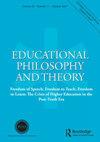马克思在STEAM教育与实践中的批判教育学、再生产与审美素养思想
IF 1.8
4区 教育学
Q2 EDUCATION & EDUCATIONAL RESEARCH
引用次数: 2
摘要
本文章由计算机程序翻译,如有差异,请以英文原文为准。
Karl Marx’s thoughts on critical pedagogy, reproduction, and aesthetic literacy in STEAM education and praxis
Abstract This article sheds new light on Karl Marx’s theoretical legacy to promote educational philosophy and theory in science, technology, engineering, arts, and mathematics (STEAM) education. Accordingly, this article selects Marxian thought as an exemplar case to elaborate critical pedagogy and aesthetics and culminate with an overview of the Marxian approach to the theoretical underpinnings of STEAM education. Hence, the article critically reviews Marx’s original works and earlier Marxian scholars’ contributions to extending critical pedagogy and its applications to the STEAM paradigm and informational and communication technology (ICT) development. This article critiques notable structural problems of STEAM education that produce power differentials such as educational gaps and digital divides in the current age of digital capitalism. Given the context, this article refines art and communication theories through the lens of his biography and writings. Additionally, this article incorporates the Marxian viewpoints about reproduction and aesthetic literacy into STEAM education. Overall, this article reviews the theoretical legacy of Marx and his essential critical and pedagogical theory, calling on scholars to pay close attention to re-orienting STEAM pedagogy as an emerging multidisciplinary field.
求助全文
通过发布文献求助,成功后即可免费获取论文全文。
去求助
来源期刊

Educational Philosophy and Theory
EDUCATION & EDUCATIONAL RESEARCH-
CiteScore
4.20
自引率
15.00%
发文量
171
期刊介绍:
Educational Philosophy and Theory publishes articles concerned with all aspects of educational philosophy. It will also consider manuscripts from other areas of pure or applied educational research. In this latter category the journal has published manuscripts concerned with curriculum theory, educational administration, the politics of education, educational history, educational policy, and higher education. As part of the journal''s commitment to extending the dialogues of educational philosophy to the profession and education''s several disciplines, it encourages the submission of manuscripts from collateral areas of study in education, the arts, and sciences, as well as from professional educators. Nevertheless, manuscripts must be germane to the ongoing conversations and dialogues of educational philosophy.
 求助内容:
求助内容: 应助结果提醒方式:
应助结果提醒方式:


